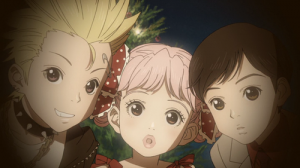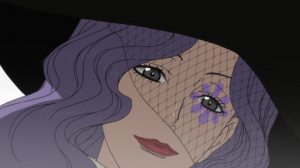Paradise Kiss: Girls, Interrupted
By Caitlin Moore
For more Fujoshi Feminism Articles, click here

While Yukari’s story is a wonderful coming age story of a girl learning not to be defined by those around her, the female secondary characters, Miwako and Isabella, are not so lucky. Although they too are coming of age in their own right, their storylines are severely lacking compared to Yukari’s. That is more or less to be expected, considering they are supporting characters, but they deserve much more fleshed out characterizations than they got.
Miwako’s primary role in Paradise Kiss is Yukari’s friend and confidant, an essential ally in her tumultuous period of self-discovery and shifting identity. She plays this role admirably, supporting Yukari and using her connections to introduce her to the fashion industry. Yukari has, however, unwittingly reintroduced an old conflict back into her life: the love triangle between her, her boyfriend Arashi, and their childhood friend Hiroyuki Tokumori. Miwako chose Arashi and cut off contact with Hiroyuki years ago, despite harboring feelings for both of them. Now that Yukari has gotten Miwako and Hiro back in touch, Arashi is obsessively jealous and possessive.
If that summary sounds like a run of the mill shoujo soap, it more or less reads that way. One of my consistent objections to shoujo manga is that they romanticize men who treat the women in their lives like trash. Arashi, despite his unconventional appearance, behaves in a way that is fairly typical for that conventional character: when he learns that Miwako is in touch with Hiro, he starts acting like a complete ass. Around midway through the series, he snottily refuses to do beadwork with Miwako at her house: “I’m mad because you’ve been talking to me all day like nothing happened. You’ve got some kind of nerve… You were playing dumb all this time. I’ve gotta think something happened.” “Miwako thought you’d be mad if she told you! You get mad either way, Arashi!” Miwako feels trapped and guilty not because of any wrongdoing, but because of Arashi’s childish, passive-aggressive tactics and irrational jealousy.
As the series continues, Arashi grows increasingly paranoid and controlling, and Miwako turns more and more to Hiro for emotional support in dealing with her volatile boyfriend. Eventually, Miwako comes into the bedroom to find Arashi going through her phone and looking at the texts she’s been exchanging with Hiro, and throws it against the wall in rage, breaking it. There are no two ways to look at it: Arashi’s behavior is abusive. No amount of justification, apologizing, or self-deprecation will change that. It only gets worse as Hiro, talking with Arashi, reveals that he knows how Arashi got Miwako to choose him: he raped her, using sex to bind her to him. Arashi feels guilty, for their past and his present temper, but Hiro reassures him, “Miwako understood best how much you loved her. That’s why she wanted to make amends. Because she thought her reaction might hurt you.” I can not even begin to described how messed up and frustrating this whole scene is, seriously marring an otherwise great manga. Arashi realizes his actions are wrong and his choices hurt Miwako. The other characters are all much, much, much too willing not only to forgive him, but actively assuage his guilty conscience. There is nothing in the text to imply that what Arashi did was reprehensible, nor are there any consequences for his actions beyond his guilt.
Part of the reason for Arashi’s insecurity is his guilt for “turning Miwako into a sexual being,” Hiro says. But Miwako didn’t suddenly turn into a sexual being the moment she was involuntarily penetrated by a penis. Female sexuality isn’t defined or initiated by the loss of virginity. Chances are, Miwako was already a sexual being, with her own desires and feelings well before she was assaulted, especially considering her home life was probably less restrictive and repressive than the average. At best, the attitude that Arashi turned Miwako into a sexual being is ignorant; at worst, it is fuel to the idea that women are naturally purer than men, but can be sullied by sexual contact. The scene, even the whole subplot, is an ugly mark against an otherwise wonderful story.
Really, the fact that Miwako’s arc is a highly conventional love triangle is a shame. Early in the manga, Miwako talks to Yukari about how she struggles creating fashion designs that are truly her own, and not an imitation of her sister Mikako’s distinctive style. At the end, Miwako goes to work for Happy Berry, excited at the idea of being a help to her sister. This would have been a far more interesting arc for her: coming to terms with the fact that while she may not be destined to be a designer herself, she can still do what she loves and be an asset to those around her.
Isabella, our other secondary female character, meets the bare minimum for a trans character. Her gender identity is respected by the text and never questioned and, outside of some ignorant comments made by Yukari at the very start referring to her as a “drag queen”, the other characters are respectful as well. Her butler, who basically raised her, says he is “proud that she’s grown from such a timid young boy to an elegant lady.” When Arashi, annoyed that she’s asking the men to carry the groceries, complains, “You’re a gentleman too, Daisuke Yamamoto,” Yukari, Miwako, George, and Isabella herself react in shock and horror. There are no cheap “dude looks like a lady” jokes, nor any about her femininity or masculinity.
Unfortunately, there’s not too much to say about Isabella’s character other than “inoffensive transwoman” and “group mom”. She has no character arc on her own, instead playing a purely supportive role to the others. There are few statements to be made about her other than her appearance, her gender identity, and her position within the group. When she is doing Yukari’s makeup for the student fashion show, she tells a story from her childhood. In third grade, she came out to George and a few days later, he showed up on her doorstep, insisting they celebrate her birthday and giving her a box. When she tells him that her birthday was months ago, he says, “That was Mr. Yamamoto’s birthday.” The box he gave her contained a beautiful dress and hat he had made for her – his first design ever. It’s a sweet enough story, but it’s more about George and the power of fashion than about Isabella and her identity.
Because Paradise Kiss succeeded so strongly in its telling of Yukari’s story of growth and attainment of maturity, its failings in telling Miwako and Isabella’s respective stories are thrown into sharp, ugly relief. While Yukari’s story is one of coming to terms with herself, finding her identity, and achieving real independence, Miwako’s moves in the opposite direction, and Isabella’s hardly moves at all. While it doesn’t make the series unreadable, it does undermine its central thesis.

